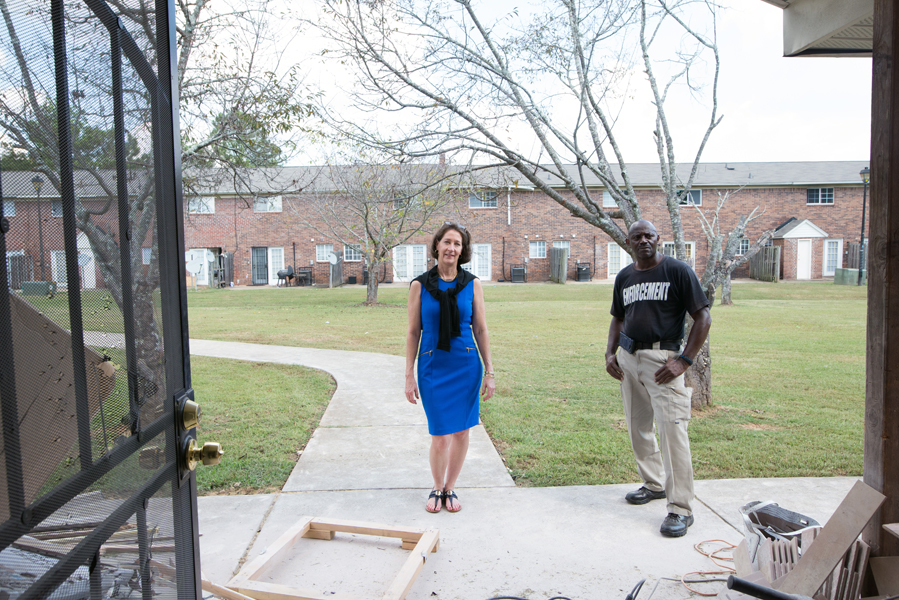
Photo by Ali Sardar
Marjy Stagmeier visits Springview apartments in southwest Atlanta, which her company is renovating. Stagmeier is managing partner in TriStar Real Estate Investments and founded the TriStar Community Impact Fund to buy and stabilize apartments in blighted areas, with the goal of positively impacting schools.
ATLANTA — High above Peachtree Street, on the 11th floor of the Colony Square building, a cool blue-gray light filters through the windows of Marjy Stagmeier’s office.
Wearing a black and white dress and jacket, Stagmeier sits at the end of a conference table in front of an extra-large computer screen. With a click, she calls up photos of apartment interiors, some with mold-splotched walls, punched-out drywall, charred and burned kitchens. Another has gaping holes in the drywall where thieves tore out copper piping. These are the properties she has been buying and fixing.
Stagmeier and her business partner, Duncan Gibbs, run TriStar Real Estate Investment. Their office is walking distance from her home in Ansley Park, a residential area of graceful old houses just blocks over from Peachtree Street.
But Stagmeier’s purview stretches all the way from Ansley to battered 1970s-era complexes lining Interstate 75 north of Atlanta, to Clarkston, Ga., apartments housing refugees east of the city, to a cluster of apartments in southwest Atlanta near the airport.
Stagmeier believes she knows the solution to the poorly performing schools in those neighborhoods. In a sense she has a black-and-white answer to problems that big philanthropists like the Gates Foundation and policymakers have been trying to solve.
Why give $5 million — as education foundations do — to schools when the same $5 million could be spent to change the conditions in which the kids live, she asks.
“All the corporations are trying to invest in schools,” she said. “All that money will walk out the door” if living conditions don’t change.
“If your apartment community is healthy then your ecosystem around you will be healthy,” she said. “If there’s turmoil in the community there will be turmoil in the school.”
Stagmeier has found a place where the financial interest of landlords could mesh with the financial needs of low-income tenants — and could ultimately impact poorly performing high-poverty schools, she believes.
She calls it an education model with an affordable housing solution.
Provide affordable, stable rent alongside other services that reduce transiency. Add an after-school program that works closely with the school. Families will have greater stability, transiency will decline, children can attend to their education, and their schools will improve.
Some educators would disagree
Some educators might argue that changing the ecosystems within schools is exactly what they have done with notable success.
For example, the small schools movement had resounding success, writes Andrea Gabor in her new book “After the Education Wars: How Smart Schools Upend the Business of Reform.”
New York City schools such as Central Park East, founded by renowned educator Deborah Meier, served low-income kids and saw almost all graduate from high school at a time when New York’s dropout rate for minority students was 60 percent.
Gabor argues that policymakers and foundations should look at these successes. She says they should stop trying to apply a top-down factory model to schools and instead adopt the approach of Meier and others, which included giving authority to teachers, running the school collaboratively and instituting a rigorous accountability system not based on standardized tests.
In other words, the right changes to schools can result in student success despite the surrounding poverty.
But the crafters of the small school movement would not be likely to argue against Stagmeier’s vision of what landlords can and should do to improve communities.
Stagmeier started on this path with the startling improvement of Brumby Elementary in Cobb County. She’s experimenting with Willow Branch apartments, which house resettled refugees in Clarkston. And she’s forging ahead at two complexes TriStar bought this summer in southwest Atlanta: Summerdale Commons and Springview.
TriStar is now in the process of buying another complex in metro Atlanta. And the nonprofit Star-C, founded by Stagmeier but separate from TriStar, is branching out. It’s beginning to contract with other landlords to offer them the tenant services that Stagmeier believes can be transformative in their complexes.
Spreading the word among landlords
Stagmeier and Gibbs have created a vehicle, TriStar Community Impact Fund, to raise money to buy more apartments. Social impact funds offer investors a way to make money while also creating a positive social impact. Investors get a lower return — in this case 3.7 percent — but they would be contributing to affordable housing and improved schools, Stagmeier says. Star-C would provide services including after-school programs at the apartments.
Stagmeier is also interviewing some of the longest-term tenants in apartments that she runs. She wants to learn how and why they have stayed despite the previous drug dealing, prostitution and other problems. She’s been influenced by Matthew Desmond, author of the Pulitzer Prize-winning book “Evicted: Poverty and Profit in the American City,” She’s writing her own book, focusing on the lives of her tenants and the impact of cleaning up their apartment complexes.
Other landlords around the country are calling her, asking about this “education model with an affordable housing solution.”
Stagmeier believes that educating landlords is the way to make change. She can show them how it makes fine economic sense to improve rental housing.
She’s businesslike and matter-of-fact.
“Apartments really have an impact on schools,” she said.





























